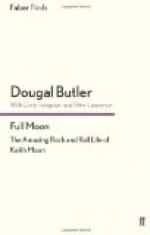“He can save himself the trouble,” said Barrant. “The solution of Robert Turold’s death lies in these two rooms, if anywhere.”
Something in his companion’s tone caused Inspector Dawfield to direct an interrogative glance at him. “Have you discovered something?” he asked.
“Finger-marks on the left arm, a left-hand impression, I should say.”
He drew back the loose sleeve of the dead man, and Dawfield examined the marks attentively. “This is strange,” he said. “It looks suspicious.”
“Strange enough, and certainly suspicious. The point is, is it suspicious enough to upset the theory of suicide? The marks are too faint to enable us to determine whether they are of recent origin. But I think that we must assume that they are. It has occurred to me that they may have been caused when the body was picked up from the floor of the other room and carried in here.”
“In that case the marks would have been underneath the arm. In lifting a heavy weight like a corpse it would be natural to place the hands under the shoulders, for greater lifting power.”
“There’s something in that, but it’s by no means certain. It would depend on the position of the body. According to Pengowan’s report, Robert Turold was found lying face downward. The body would have to be turned over before it was lifted, and the grip might have been made in pulling it over. We must find that out.”
“It’s a point which can be settled at once by questioning Thalassa. He helped Pengowan carry the body into this room.”
“That is the very thing I do not wish to do,” rejoined Barrant quickly. “We have to remember that Thalassa is, for the time being, suspect. Mrs. Pendleton’s suspicions of him may be based on the slightest foundation, but we are bound to keep them in mind.”
“Do you not intend to question him at all?”
“Not at present. His attitude when he brought me upstairs was that of a man on his guard, expecting to be questioned. I saw that at once, and decided to say nothing to him. I will take him by surprise later on, when he is off his guard, and if he is keeping anything back I may be able to get it out of him. But we must not be too quick in drawing the conclusion that those marks were made by him.”
“What makes you say so?” asked Inspector Dawfield.
“Thalassa has a long bony hand, with fingers thickened by rough work. I noticed it when he was pointing to these rooms from the passage. This grip looks as if it might have been made by a smaller hand, with slim fingers. Look how close together the marks are! Unfortunately, that’s about all we’re likely to deduce from them, and I doubt if a finger-print expert will be able to help us. Observe, there are no finger-prints—merely faint marks of the middle of the fingers, and a kind of blur for the thumb. But the thing is suspicious, undoubtedly suspicious.”
“Still, the door was locked from inside,” said Dawfield. “We mustn’t lose sight of that fact.”




